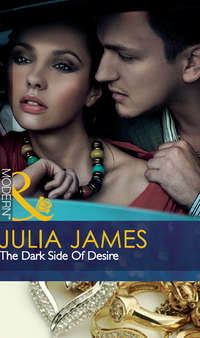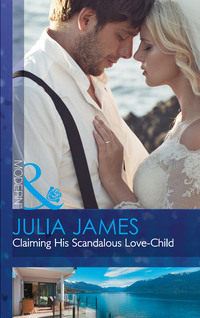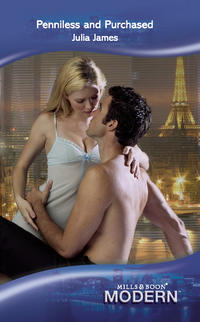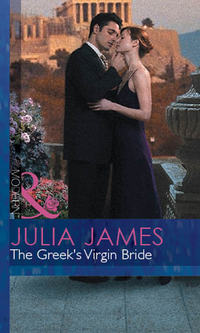
Полная версия
The Italian's Token Wife
The peace lasted until the plane landed. Then, in the confusion of a busy Italian airport, hanging on to a wailing Benji, whose ears had set off again during the descent into Pisa, Magda once more felt like that tin can rattling along a motorway.
A hand pressed, not roughly, but insistently, into the small of her back.
‘This way,’ said Rafaello di Viscenti, the man she had married a handful of hours ago, and guided her forward. They made their way out of the airport to where a large limousine hummed at the kerb. Within moments they were inside, luggage in the boot, and the chauffeur was drawing out into the traffic.
The journey took well over an hour, and the latter part, away from the autostrada, was by far the most fascinating. Magda stared out of the window, drinking in the Tuscan landscape, a world away from the rainy South London streets she had left that morning. As the car purred along she pointed things out to Benji, whose baby seat was closest to the window. She leant over him, glad of the opportunity to put as much distance between herself and the man occupying the far corner of the huge car. Since he seemed to be preoccupied with his work still, tapping away at a laptop on his knees, she assumed he preferred to be left alone.
That suited her completely. Having to make stilted conversation with him would have been much worse. Right now, she just wanted to savour being in Italy.
Talking softly to Benji, she drank it all in. Road signs in Italian, driving on the wrong side of the road, houses, cars and people—all Italian. They were steadily climbing, she realised, heading up into the hills. Summer sunlight drenched the rolling landscape, etching the cypresses like ink. She stared, entranced. Stone farmhouses and picturesque stone-built towns, olive groves and vineyards, goats and sheep grazing, and, as the road grew steeper and narrower, old men with donkeys, old women covered in black from headscarf to heavy shoes.
Finally, as the roads grew narrower and the traffic more and more sparse, the limo slowed and turned in through large ironwork gates that opened at a buzz from the chauffeur. She heard Rafaello click off his laptop and close it up.
‘We are here,’ he announced.
She glanced briefly across at him. His face was expressionless and, it seemed to her, particularly tense. Automatically she tensed as well. It dawned on her that the flight and car journey had been nothing more than an interlude. Now, right now, in front of others, she was about to take on the role of Signora di Viscenti.
As if reading her attack of nerves, Rafaello spoke suddenly.
‘Be calm,’ he instructed. ‘There is nothing for you to be anxious about. For you, this is simply a job. Please remember that.’
Was she imagining it, or had a grimmer note entered his tense voice? His dark gaze flicked over her again, and something in it sent a chill through her. Instinctively, Magda felt the chill was not directed at her. But there was anger deep down in there somewhere, she knew. Anger at having been required to marry at all.
Well, she thought resolutely, that was his business, not hers. She was simply doing what he was—to put it bluntly—paying her to do. She had gone through a wedding ceremony but it was nothing more than a legal formality. She was Signora di Viscenti in nothing more than name—and she would never be anything else.
For a moment so brief it hardly existed a longing struck her, so intense it pierced like pain, that somehow, if fairytales were real, this might be one—she really was sweeping along the driveway to her new home, with a husband beside her to die for…
But fairytales weren’t real. They were just…fairytales.
Nothing to do with her.
The car drew up in front of a castellated villa that made Magda’s eyes widen in wonder. It was ancient—and beautiful. The old stone was weathered, the huge wooden door studded, and the grounds stretched all the way to the woods and hills beyond.
Carefully she extracted Benji, who had been lulled off to sleep some time ago, by the rocking motion of the car, and clambered out with him. She held him on her hip and gazed around. The warmth of the late afternoon after the limo’s air-conditioning struck her like a blessing, warming her through the thin material of the cotton dress she was wearing. It was the best she possessed, though it had cost under five pounds in a charity shop and was a size too large for her. Its low-waisted, button-fronted style, she knew, would probably have suited a matron of fifty better than herself. But what did it matter? If Rafaello di Viscenti had objected to it he would have got one of his minions to arrange an alternative.
‘Come—’ The man she had married that morning slipped a hand under her elbow. There was a tension in his grip that communicated itself to her and to Benji, who gave a little grizzle.
Magda suffered a swift glance at Rafaello’s face. Its expression was closed and shuttered, and looked, she thought, very remote. Instinctively she realised that she and Benji were the last things on his mind.
As they approached the front door it swung open suddenly, and a man came out. He was elderly, dressed in shirtsleeves and a waistcoat, and she realised he must be some sort of butler. He greeted Rafaello, and though she could understand not a word she could tell he had definitely not been expecting his arrival.
And certainly not hers.
More rapid Italian followed, and Magda was sure she was not imagining the strong disapproval in the man’s reaction—nor the shocked expression when he took in not just her, but Benji, too. Rafaello, she could tell, was simply terse and uncommunicative—and definitely not pleased by something the man had said to him.
Then they were indoors and Rafaello was turning to her.
‘You and the child must be tired. I am sure you would like to rest a while. Come.’ His voice was impersonal.
They proceeded up a grand staircase, and Magda could not help staring bug-eyed around her. The inside of the house was as beautiful as the outside, with white plain plaster walls hung with tapestries and oil paintings, and a marble staircase edged with scrolling wrought-iron banisters. Everything looked incredibly antique and expensive, a world away from the modern luxury apartments she cleaned.
Disbelief welled through her again—she was going to live here for the next few weeks? This was definitely a fairytale!
Rafaello took her into a large room leading off the broad upper landing. Again she just gazed around, wide-eyed. A vast carved wooden bed dominated the room, which was filled with huge pieces of furniture but, such was the size of the room, there was no sense of being cramped at all. A fabulous Persian carpet spread out beneath her feet, and heavy drapes cascaded to the floor either side of the pair of shuttered windows. A huge stone fireplace faced the bed.
‘The en suite bathroom is through that door,’ Rafaello informed her in the same terse, blank tone. ‘Do you have all that you need for yourself and the child? Giuseppe will obtain anything you ask him for.’
She managed to nod, feeling incredibly awkward. The butler-type—Giuseppe, she presumed—had followed them up, and now came in, carrying her suitcase from the limo. Its shabbiness looked as out of place here as she did.
‘Good,’ said Rafaello. He glanced at his watch. ‘Refresh yourself, and the child. Would you like some coffee?’
She nodded. ‘Th-thank you,’ she stammered faintly.
‘Good,’ he said again. ‘Giuseppe will show you downstairs in a while, when you are rested. Oh…’ He paused, and his eyes flicked over her again, unreadably. ‘There is no need for you to change.’
Then he was gone, and Giuseppe with him.
Alone, Magda gazed around again. It was obvious that she was simply being stashed away until required, but she could hardly complain about her storage conditions. The room was exquisite. Her only worry was that everything in it was far too precious for her and Benji.
Benji, however, was eager to be mobile. She put him down and he promptly tottered off, eagerly exploring this new environment. She watched him head for the huge bed. She would not have to ask for a cot—the bed was easily big enough for her and Benji.
And her husband?
She pushed the thought away. Rafaello di Viscenti was her husband by nothing more than a legal sleight-of-hand. Where he slept had nothing to do with her.
Rafaello walked back down the staircase, his expression tight. He did not look forward to the imminent confrontation, but it was both inevitable and essential. He had to teach his father, once and for all, that he was not a puppet with strings to be pulled.
For his father Viscenti AG, founded over a hundred years ago to restore the ailing fortunes of a landed family, was simply a business, yielding a more than comfortable living for the di Viscentis.
Rafaello knew better. The world had shifted—globalisation was the name of the game. The only game. Viscenti AG had to move into the twenty-first century, and the only way to do that was to become major league on a global stage. The euro was seeing to that, if nothing else—Europe was wide open, and the blast of competition blew with a chillier wind than ever. Cosy family businesses just wouldn’t survive.
Up till now Rafaello had had to fight for his strategy of taking Viscenti AG global every inch of the way with his father. He might be chief executive, but his father was chairman, and owned the majority shareholding. He had looked with grudging disapproval upon all Rafaello’s endless labours in opening up the European market to the company, and, even though turnover and profits were soaring, Rafaello knew his father wished Viscenti AG had stayed the native enterprise it always had been.
But Rafaello had worked his backside off for the company he had so dramatically expanded, and he was not, not about to see his efforts wasted—or the family company sold off to strangers.
To prevent that he would do anything—whatever it took.
As he had proved that morning.
He strode across the marble-floored hallway and into the book-lined library he used as an office. Crossing to the window that overlooked the ornamental pool with its trickling fountain, Rafaello pushed back the sides of his suit jacket and splayed his fingers along his hips, looking out moodily. Typical of his father not to be here when he wanted him to be. Giuseppe had informed him, when he’d arrived, that both his father and cousin had gone out for lunch and were not expected back until late afternoon. He’d then promptly gone on to try and discover who the young female with the baby was.
Rafaello had cut him off, refusing to be drawn. The girl’s identity was going to be a surprise for everyone. Oh, yes, certainly a surprise. He gave a grim smile. She was, just as he had anticipated, ideal. She’d stared around open-mouthed as he’d taken her upstairs, as though she’d landed on an alien planet, her child hitched on her hip, her cheap, wrong-sized, unflattering dress hanging on her skinny body, her complexion pasty and her mud-coloured hair scraped back.
His smile tightened. His father would be incandescent with rage—not just at having been outmanoeuvred, but at having the name of di Viscenti so totally insulted by his own son presenting him with such a female for a daughter-in-law.
A momentary frown creased his brow, then it cleared. The girl could have no idea of what made her so ideal for his purposes—and, besides, she was being paid what was for her a vast sum of money, had entered into the arrangement of her own free will. So far she had done exactly what he wanted—which was, predominantly, to do what she was told, ask no questions and keep out of the way until required.
He turned away from the window and sat himself down at his desk. He might as well get some work done while he was waiting. It might distract him from the coming confrontation.
Why did it have to be like this? he wondered, his expression drawn. Why this unnecessary, painful showdown with his father? Why couldn’t he simply talk to him—communicate instead of confront?
He sighed. He’d had more communication in the last fifteen years with Giuseppe and his wife Maria. It had been they who’d seen him through from adolescence to adulthood—Giuseppe, who’d doused his morning-after head before his father saw him; Maria, who’d refused to hand him the keys of his first sports car when he’d been too angry to drive after another explosive head-to-head with his father. And it had been Giuseppe who’d listened to him when he’d expounded his dreams of making Viscenti AG a global name, Maria who’d rung a peal over him for leaving a trail of besotted girls behind him, making him wise up and stick to society women.
He knew his father considered him dissolute—hence his determination to force him into matrimony. His mouth tightened. If there had been any real hope of communication with his father he would not have had to do what he had done this morning. A shadow crossed his eyes. It was his mother’s death in a road accident when he was fifteen that had caused the rift between father and son. They had both grieved—but not together. His father, mourning his adored wife, had withdrawn, cutting off his son. And Rafaello knew, with the hindsight of his thirty years, that the wild behaviour he had plunged into as a teenager—the fast cars, the partying, the girls—had been his cry for attention, for help—for love from a father who had turned away from him just when he needed him more than ever.
And now it was too late. The wall between them that had been laid, brick by brick, in Rafaello’s adolescence was too solid to break through. His father had hardened, and so had he. Now there was only challenge—and strife.
With the latest round just about to start.
The sound of a car approaching along the drive made him look up from his work. He could recognise the note of the pricey little roadster that his cousin Lucia drove. It was always important to her to be seen in the right car, wearing the latest clothes by the best designers, and socialising with the right people. Hence her burning desire for a rich husband.
When he could hear voices out in the hallway he strolled out, forcing himself to appear relaxed.
‘Rafaello?’ His father stopped short.
‘Papà.’ Rafaello strolled forward.
‘When did you get here?’ demanded Enrico di Viscenti, visibly taken aback by his son’s arrival.
‘This afternoon,’ replied his son laconically, and proceeded to cross to where his cousin was standing, stock still.
‘Lucia,’ he said dutifully, and bent to kiss her on either cheek. She smelt of too much perfume, and her face was too made up, but she was a handsome female for all that—as she well knew.
‘Rafaello,’ she murmured. ‘Such a surprise.’ Her voice was neutral, her eyes assessing. Rafaello returned her look blandly.
‘As you see, the prodigal returns,’ he observed laconically. ‘Have you had a pleasant day?’
‘Very,’ returned Lucia. ‘Tio Enrico accompanied me to the launch of an art exhibition in Firenze. A new artist I enjoy.’
A polite smile grazed Rafaello’s mouth. ‘And does he enjoy you, too?’ he murmured.
Lucia’s face stiffened immediately. ‘You offend, Rafaello!’ she snapped.
He shrugged elegantly. He shouldn’t bait her, he knew—but he was well aware that Lucia Foscesca took her lovers mostly from artistic circles. Young men who were likely to put up with her in exchange for the influence she could bring to bear on their careers. It was one of the—many—reasons that Rafaello refused to gratify his parent’s insistence on the suitability of marriage between the cousins. Call him old-fashioned—and Lucia frequently did, with a taunting laugh that could not quite hide her annoyance—but he would prefer his bride to be less well acquainted with the opposite sex.
He stilled. The word ‘bride’ pulled him up short. The idea that upstairs a scrawny, unlovely, sexually undiscriminating twenty-one-year-old English girl, with a nameless, fatherless child in her arms, was actually, in the eyes of the law, his bride of less than twelve hours struck him as completely unbelievable. Had he really gone through with it? What he had done still felt completely unreal. Insane. Then he hardened his resolve.
Yes, he had done it—put his name and hers on a wedding certificate. He had had no other option. His hand had been forced. Angry resentment seethed through him, but he banked it down. He’d get his revenge for what his stubborn, pig-headed father had made him do—get it right now.
His father was speaking again.
‘And to what, may I ask—’ his father’s voice sounded biting ‘—do we owe this unexpected honour?’
Rafaello’s dark eyes glinted. ‘Why, Papà, tomorrow is my thirtieth birthday. Surely you knew I would come?’
Enrico di Viscenti’s eyes narrowed. ‘Did I?’ he countered.
His son smiled. ‘And here I am—as dutiful as ever. Come,’ he went on, ‘join me on the terrace—I believe a little…celebration…is in order.’
He was aware of Lucia’s piercing scrutiny and sudden, riveted attention, and his gaze moved from his father to meet her assessing gaze. He smiled blandly, his eyes glinting just as his father’s had done.
‘Lucia—you will join us, of course.’
His voice was urbane, but it signalled volumes. He watched as a slow expression of satisfaction, swiftly veiled, passed over her handsome features.
‘Good,’ said Rafaello, and smiled again. But beneath the smile a hard, tight band seemed to be lashing itself around his heart.
CHAPTER THREE
‘WELL?’ demanded Enrico, taking his seat at the ornate ironwork table at the shady end of the terrace outside the formal drawing room of the villa. ‘Can it be that you have come to your senses at last?’ His voice was sharp, and the gaze he rested on his son even sharper.
The hard, tight rope around Rafaello’s chest lashed the knot around his chest tighter.
‘Did you doubt that I would, Papà?’ he replied, his voice level.
His father made a sound in his throat between a growl and a rasp. ‘I know you are more obstinate and self-willed than any father deserves. It was always the way with you!’
‘Well,’ said Rafaello, with a temporising air, ‘for once I am being the model son—’
If there was a bite in his voice, no one heard it. He went on, ‘But first I would like, Papà, to confirm that if I do what you want, and marry by my thirtieth birthday, you will give me undisputed control of the company. Is that right?’ Rafaello addressed his father directly, keeping his voice brisk and businesslike.
‘Hah!’ exclaimed his father. ‘You know perfectly well it is so.’
‘And you give me your word on that?’
‘Of course.’ He sounded affronted that he had even been asked.
Rafaello smiled inexpressively. ‘In which case, Papà,’ he went smoothly on, his voice bland, ‘you may wish me happy—and keep to your side of the agreement.’
His father stilled, his hands gripping the arms of his chair, unable to speak for the moment. Not so Lucia. With a breathless little laugh, she spoke.
‘Rafaello, you are the most abominable man.’ Her voice was full of flirtatious exasperation. ‘Proposing to me in such a fashion.’ She gave her tinkling laugh again. ‘But I shall punish you for your lack of gallantry, be sure of that.’ She turned to her prospective father-in-law. ‘Tell me, Enrico,’ she said with coy feminine teasing, ‘how shall I punish this boorish son of yours for depriving me of my rightful wooing?’
She gave another little laugh, coquettish now, and let her gaze slip back to her husband-to-be.
There was a curious look on his face. Half-shuttered, half-revealing. He held up a hand.
‘Before we go any further, I think it is time for champagne, no?’
On cue, Giuseppe appeared, bearing the requisite beverage, and as he placed the tray on the table between them Rafaello murmured something to him. The man nodded, and retired. Rafaello busied himself opening the bottle and liberally filling up the glasses and spreading them around.
Lucia gave a click of irritation. ‘Giuseppe has brought one glass too many,’ she said acidly. ‘It is high time he took his pension!’
Rafaello presented her with her foaming narrow glass. ‘When you are mistress here, you may tell him so,’ he said lightly.
A small but distinct smirk of satisfaction—and anticipation—curled at her scarlet mouth. Rafaello watched it, his face still quite unreadable.
His father picked up his glass and got to his feet. ‘A toast.’ Satisfaction rang in his voice. He was well pleased with his son’s decision to finally see reason, as was his niece. ‘A toast to the new Signora di Viscenti—’
Rafaello lifted his glass. ‘How kind,’ he murmured. There was a slight sound in the doorway to the drawing room and he tilted his head towards it. ‘And how very timely.’
The girl stood there, Giuseppe just behind her. Fierce gratification surged through Rafaello. The girl made exactly the picture he had intended. As the others at the table turned to stare at her she stood there, atrociously dressed, her hair drawn back off her plain face with an elastic band, and—best of all—an open-mouthed baby on her hip. Her expression was completely blank.
Rafaello got to his feet and drew her forward. She was as stiff and unyielding as a board, and almost stumbled. He took her hand, making sure the wedding ring was visible.
‘Allow me to present,’ he said, in a voice that was as bland as milk, ‘my wife, Signora di Viscenti.’
For a moment, as Magda stood completely immobile, wanting the earth to swallow her, there was complete silence. Then, a second later, there was uproar.
It was the old man’s voice that was the loudest. It was like a lion roaring. She could understand not a word, but the rage in it was like a hurricane pouring over her. At her side Rafaello di Viscenti, the man to whom she had been legally joined in matrimony, gripped her left hand in a vice.
Her breath was frozen in her chest. The old man—who just had to be Rafaello di Viscenti’s father, for the arrogance of his head and the similarity of the features argued nothing else—was still roaring. The butler-type was looking as if he’d been hit over the head by a heavy object—and the woman sitting next to the older Signor di Viscenti was simply looking totally and completely incredulous.
For one long, timeless instant there was nothing except the roaring Italian rage of the old man, and then, in absolute terror, Benji started to howl.
Magda jerked her hand free and used it to cradle her son up against her breast, turning away, back into the lavishly elegant drawing room.
What on earth was going on? A new voice had interrupted the roaring—Rafaello’s. His voice was sharper, far more biting, but just as angry. Desperately Magda got as far away as she could, clutching the sobbing Benji to her while she tried to calm him—an impossible task, given the human racket going on out on the terrace.
Suddenly her sleeve was seized. There was an overpowering smell of heavy perfume, and a voice was hissing something at her in Italian. The venom in the words, incomprehensible though they were, made Magda flinch.
‘Please—’ she said jerkily. ‘I…I don’t understand.’
The woman caught breath. Her eyes narrowed. ‘Inglese?’ Then she shook Magda’s arm again. ‘Who are you? What are you playing at? Pretending to be Rafaello’s bride.’ The woman tried to seize her ring finger, as if to check its authenticity, but Magda fielded her off, turning so that her body was between the woman and Benji. He was still howling fearfully.
She tore herself away and headed for the door. Stumbling, Benji still wailing in terror, she rushed across the marble hall and hurled herself up the staircase as quickly as she could, heading back to the sanctuary of the bedroom. Only when she was safely within did she pause to draw breath.
Her first thought was for Benji. He was all but hysterical now, and calming him down took for ever. But gradually, as she sat on the bed with him on her lap, rocking gently and soothingly, his anguished sobs died away. A thumb slipped into his mouth and he began to relax at last.









